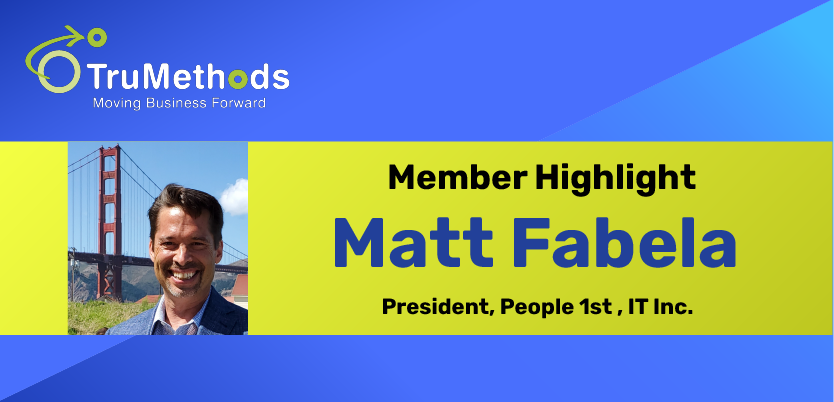Holding yourself accountable for your outcomes isn’t easy. But when you get together with a group of like-minded individuals, anything is possible.
“The biggest barrier to success in my business is me — not afraid to say that,” Matt Fabela, President at People 1st, a San Francisco-based MSP, told me during a conversation. “Gary shows you how, through consistent action (daily disciplined steps), you can transform your business from an average MSP to a World Class MSP. “TruMethods is not built on hypothetical theory — it’s built on proven success from MSPs that have applied its processes.”
During our discussion, Matt revealed how his company has grown since joining the TruMethods TruPeer group, how peer groups can be beneficial to MSPs and why MSPs in peer groups have a competitive advantage in their respective markets.
A lightly edited transcript of our conversation follows.
Why did you decide to join TruMethods?
I joined TruMethods for several reasons. First, when I was introduced to Gary Pica’s method for building a World Class MSP, I wanted what he had. Gary had showed other MSPs how to build their businesses where they had “control” of their business and their product, pricing and client success. The process that Gary developed over the years to create separation from the average MSP was impressive. Second, Gary built two very successful MSP businesses and I knew his program mirrored the way he operated. Gary’s method for creating roles and responsibilities within a company was key to lowering our internal noise and developing real leverage over time. From the start, applying the TruMethods processes immediately began to create results for us.
Which TruMethods peer groups did you decide to join and why?
I joined the TruPeer group. The main reason for joining a peer group was to be held accountable. My company was operating at the same comfortable level for a while; however, I wanted to grow it, so joining a peer group seemed like a good idea. Another big reason for joining the group was to have a sounding board, a forum where I could share challenges with (and successes). So far, it has met my expectations.
Why are peer groups beneficial to MSPs?
In my experience, most MSPs are too busy putting out fires and working on day-to-day operations and not really able to focus on what it takes to move the business forward. With a peer group you work on the most important metrics that will move your company forward. Meeting with a peer group keeps you accountable, but it also teaches you to be disciplined in the areas that will engender real changes in your business. Real leverage is created, and leverage is power.
Why do you think MSPs that participate in peer groups have a competitive advantage?
When you surround yourself with other like-minded people, you start to develop habits that other people that aren’t in a peer group most likely will not achieve. When you have other MSPs in your group helping you achieve your goals, it empowers you to do better and also fix issues that without a peer group might not have been brought to light in a timely fashion. The competitive edge is in the numbers. The more people you have on your team working toward the same level of success the higher the chances are of success. An easy analogy would be: Do you think you could go farther rowing a canoe by yourself, or with a team of five people? The team of five people is your peer group.


